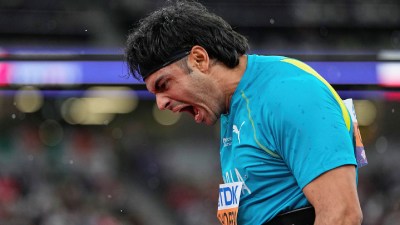Army Chief to visit N-E, assess security
NEW DELHI, NOV 1: Close on the heels of Defence Minister George Fernandes' day-long visit to Arunachal Pradesh, Chief of Army Staff Genera...

NEW DELHI, NOV 1: Close on the heels of Defence Minister George Fernandes8217; day-long visit to Arunachal Pradesh, Chief of Army Staff General S. Padmanabhan will be visiting the North-east to assess the situation on the border with China and the reported incursions.
8220;The Minister spent three hours in Arunachal Pradesh and was briefed about the situation on the border with China there. But the Gen will assess the impact of Chinese movement with military commanders on the ground,8221; said an official at the Army headquarters. 8220;There is no reason to panic. There is no Chinese soldier with arms holding any part of Indian territory there,8221; he added.
According to sources, Arunachal Pradesh Chief Minister Mukut Mithi had recently said that Chinese troops had made incursions in Indian territory and mule tracks had also been found. 8220;There is a border dispute but it is frozen. India and China have signed an agreement that no bullets will violate the border and following that we have reduced our forces there. As of now we have no reason to feel that China is increasing its troop presence at the border or is adopting a threatening posture,8221; the sources added.
Gen Padmanabhan, who had held the post of Chief of Staff of a Corps in the North-east earlier, would re-familiarise himself with the ground situation and will also look at the problem of insurgency.
The Chinese troops do come into what India insists is 8220;own territory8221; but leave later, said an official. 8220;It is there way of keeping the issue alive. We had this kind of a situation during last year8217;s Kargil conflict too but mainly in the area illegally occupied by China in Ladakh,8221; he added.
There was increased Chinese patrol movement but the Indian soldiers were asked not to escalate tension, wave to the Chinese and walk on. The Chinese often left behind biscuits, chocolate wrappers, water bottles and such items to stake their claim on the disputed area, said the official. However, the army insists that troops on the border are not the issue. 8220;They can move their troops to the border in a matter of hours since they have broad-metalled roads till the forward areas. Our posts and locations are three to four days march from the nearest road. They can deploy and reinforce rapidly. We cannot do the same for we lack good roads,8221; he added.
About his visit to the North-east, Fernandes said the road and communication network there had been ignored for decades, but for the past two years efforts were being made to improve them. Director General Border Roads Organisation also accompanied Fernandes to oversee the progress in road communication network.
Photos
- 01
- 02
- 03
- 04
- 05































